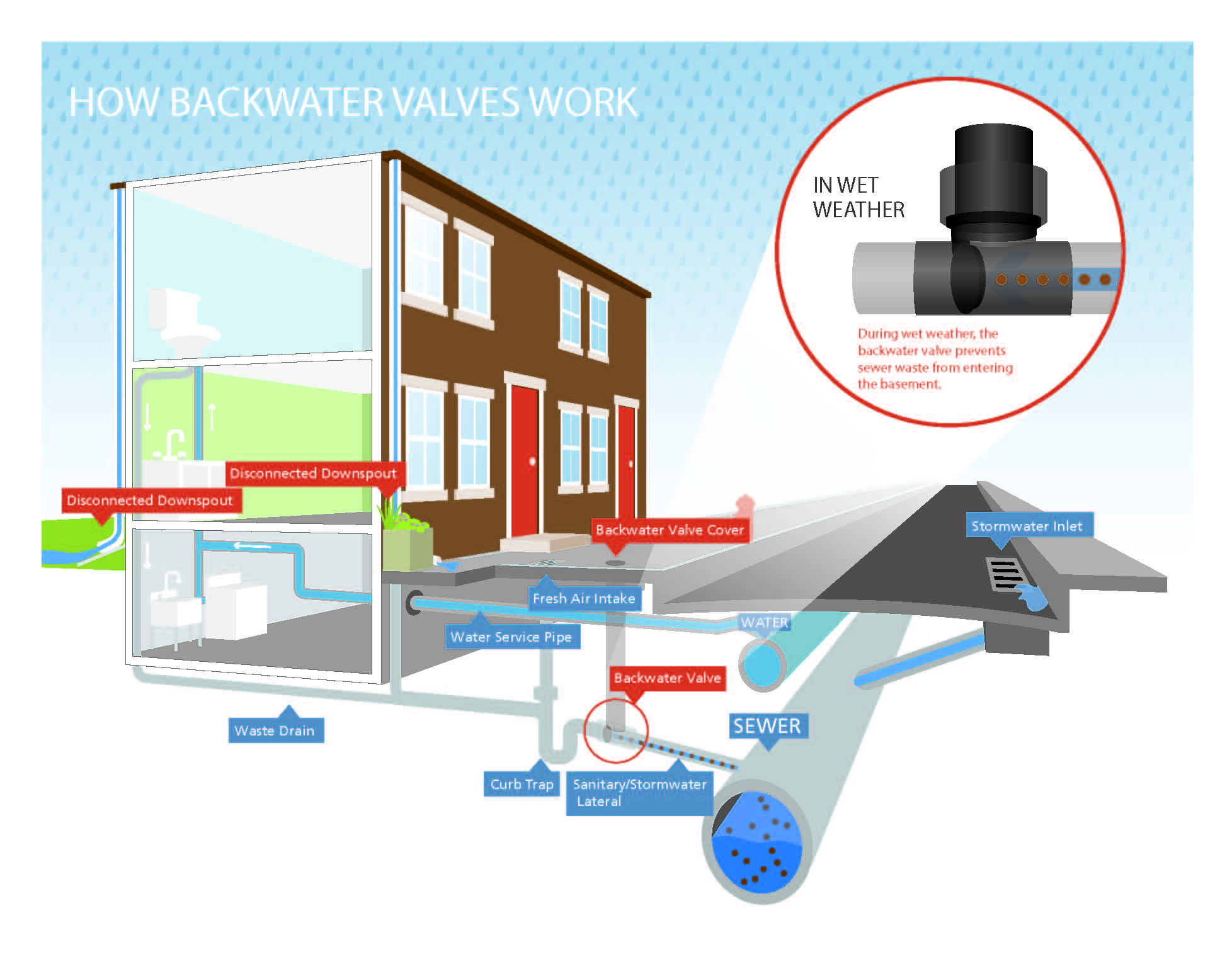Basement Protection Program FAQ
My basement has flooded. What do I do?
If you believe the water in your basement has resulted from PWD’s infrastructure during an extreme rain event, please report the problem to PWD immediately. Call 215-685-6300 to notify and to sign up for the Basement Protection Program.
Please fill out the flooding survey. Your responses will help PWD better understand the flooding problem and it’s the first step to the solution. The survey can be accessed on-line HERE.
Why and how does the sewage back up into my home?
Combined sewers are designed to collect sewage from properties and stormwater runoff from streets and properties. Under normal weather conditions – including rain – the sewer system functions well. But during intense rainstorms when we receive many inches of rain in a very short period of time, the sewers fill quickly to capacity. Although they are designed to overflow in our rivers and streams under extreme weather conditions, when they are full during these conditions, they cannot overflow quickly enough into a waterway and therefore back up into property laterals. If a property has plumbing fixtures in the basement (floor drain, utility sink, toilet), a sewer discharge into a property can occur.

That is why the Basement Protection Program is designed to provide protection to the property lateral or plumbing fixture. The installation of a backwater valve (think check valve) will only allow the water to flow in one direction.
Why do I need to disconnect my downspout?
Your roof gutters and yard drains flow into the same drainage pipe as your indoor plumbing fixtures. Often, these connections are made from the back of the property. This means that if a backwater valve is installed on your drain line in the basement, or on your property lateral in the sidewalk, the stormwater from your home can back into the basement as the lateral is full. Disconnecting the downspout so that it directs roof runoff to a green tool or open area away from properties will resolve this problem. Sample green tools include downspout planters and rain barrels. Check out our Residents Information Page for more information.
Is the City liability for the damages to my property as a result of basement backups and flooding?
No. The City is only responsible for property damage when there is a failure of its infrastructure, e.g., a water main break, a clog in the sewer, etc. Basement backups and other flooding causes are considered the result of extreme natural events such as hurricanes.
Who maintains the backwater valves installed at my property?
It is the homeowner’s responsibility to maintain the valves. PWD’s plumber provides a one year warranty for the valves and the installation. This step is designed to be simple and each participant will receive maintenance guidelines to keep the backwater valves in good condition.
Will backwater valves address water infiltration from basement walls or floors?
No. Backwater valves will only protect properties from flooding the sewer lateral. Seepage through walls and floors is the result of groundwater pressure, which occurs when the soil surrounding the basement is saturated with water. Property owners should check the overland drainage on their property to ensure that yards, walkways or driveways are not directed toward the home. There are also protective coatings that one can use to seal the wall surface. Please consult a professional.
What other steps can I take to protect my property?
- Avoid storing valuable possessions such as irreplaceable photo albums, artwork and important papers in your basement if it is prone to flooding.
- Visit the City’s Office of Emergency Management’s website to ensure that you are ready for any emergency. Go to: READY Philadelphia
- During flooding events, dangerous and life-threatening hazards may exist so it is very important to recognize these dangers. For example, avoid driving through flooded streets and intersections. To better protect your basement from flooding or to clean up your property after a flood, go to FEMA for information.
- Flood insurance is strongly recommended. You can go to floodmart.gov to determine insurance costs to your property and how to obtain flood insurance.